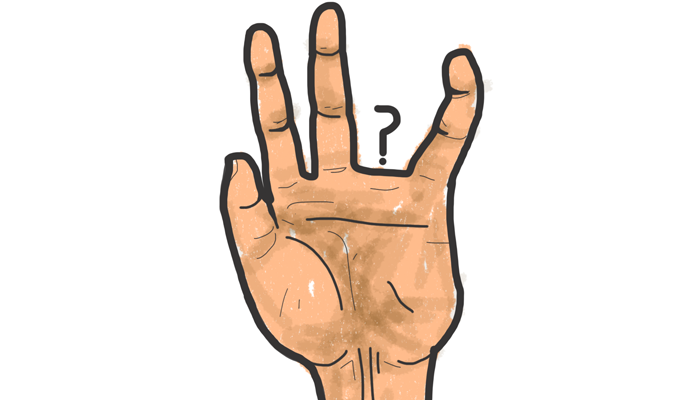You have a long list of traits and abilities you self-identify with. I self-identify with being an introvert, meaning it’s not uncommon for me to say, “I am an introvert.” I can’t stop eating chocolate. I don’t have willpower. I don’t like vegetables. I don’t recover well from training. I don’t lose fat easily. Things you self-identify with [...]
You have a long list of traits and abilities you self-identify with. I self-identify with being an introvert, meaning it’s not uncommon for me to say, “I am an introvert.”
- I can’t stop eating chocolate.
- I don’t have willpower.
- I don’t like vegetables.
- I don’t recover well from training.
- I don’t lose fat easily.
Things you self-identify with are things you are or are not, things you have or do not have, things you can or cannot do.
Sounds silly to clarify the language, but the way the statements above are phrased make them just as True to you as, “I have five fingers on my left hand.” (As long as you do have five fingers on your left hand, of course.)

Meaning they are rather fixed traits that can’t be changed.
(Even though now would be a good time to talk about the importance of a growth mindset over a fixed mindset, I’m taking us down a different path. If you’re interested in the path I’m choosing to ignore, check out Mindset.)
I suppose self-identifying with things in this fixed manner wouldn’t be tremendously terrible if the things you’re self-identifying with are True.
But this isn’t usually the case.
Which is no bueno for you.
Because self-identifying with things that aren’t True is like sawing off your big toe right before you’re about to run a marathon.
Your storytelling brain
Your brain loves stories. It not only understands the three parts (beginning, middle, end) of a story, but also recognizes when a part is missing.
Once upon a time, the end.
You’re probably itching all over. The story doesn’t make sense, and your brain doesn’t like when things don’t make sense. This isn’t Wonderland. You need to survive. You can’t do that well if you’re constantly confused.
So your brain uses a rather elegant strategy to make sense of situations that don’t readily make sense: lie. Fill in the gap with something, anything, that makes enough sense. And then move on.
How we self-identify with stories
The things you self-identify with don’t escape from a vacuum. They are conclusions you’ve made based on events you experienced.
I tried to stop eating chocolate. I didn’t stop eating chocolate. I suppose I just can’t stop eating chocolate. I ate a piece of broccoli. I didn’t like the taste. I suppose I just don’t like vegetables.
I self-identify with being an introvert because I’m not personable around people I don’t know. Social situations I’m not comfortable with give me anxiety.
Your mindset also plays a role in the conclusions you make.
If you think good painters are naturally gifted savants that cum magic out of their paintbrushes at birth, then you might conclude I’m not a good artist if you don’t like your first painting.

The conclusions often make some sense based on your beliefs about the way world works. But that doesn’t make the conclusions True.
Evidence to the contrary
I was at a club last night to celebrate a friend’s birthday party. I had a boisterous conversation with a lamp I’ve never met before last week. I backed ‘dat thang up (naked) in my room with the windows closed one minute ago.

I can do a lot of extroverted things. (Especially when I’m drunk.) I may not be comfortable or familiar with these things. (Especially when I’m sober.) But I’m certainly capable of them.
For anything you self-identify with you can ask yourself, “Is there any evidence to the contrary?” There probably will be.
So why, then, do I self-identify as an introvert?
Why say,
I am an introvert,
when I could more accurately say,
I sometimes exhibit introverted tendencies
?
Your limited brain
The brain isn’t an all seeing all powerful being. It has bugs, one of which is domain dependence.
People flock to the gym to climb on the stair master machine for an hour, but, some of those same people, when they’re shopping at the mall, take the escalator.
Domain dependence makes you believe you are “x” in “y” environment, but not “x” in “z” environment. Likely as a way avoid the pain and inconsistencies that would flood your brain if the dichotomy didn’t exist.
In order to understand that last sentence, look at what happens when you fully self-identify with something.
- Situation: I tried to stop eating cake.
- Reality: I didn’t stop eating cake.
- Story: I can’t stop eating cake.
- Situation: I don’t want to be shy.
- Reality: I was shy.
- Story: I am an introvert.
The narratives are bulletproof.
This is just the person I am. There’s nothing wrong with me. You don’t fault me for having five fingers on my left hand, so why fault me for eating cake?
Self-identity and discomfort
Now look at what happens when you partially self-identify with something (and inject something a little more True into the narrative).
- Situation: I tried to stop eating cake.
- Reality: I didn’t stop eating cake.
- Story: I have the impulse control of a six year old child. MOMMY MOMMY, CHANGE MY DIAPER.
Because if you recognize that you can stop eating cake (which is what you do if you only partially self-identify with something), then what other logical conclusion is there to make?
- Situation: I don’t want to be shy.
- Reality: I was shy.
- Story: I’m hyper-aware of what others think about me, and I live in perpetual fear of judgement and criticism, the chances of which greatly decrease if I don’t talk.
The True(r) stories hurt a little more, no? We see a side of ourselves that we neither (a) want to see, nor (b) want to acknowledge as existing.
I don’t want to admit to having impulse control issues because the person I want to be is in full control. I don’t want to admit to spending my life caring about what others think because the person I want to be is free.
Not to mention the cognitive dissonance this creates.
I want to lose fat, so I have to stop eating chocolate. And guess what? I can stop eating chocolate! Wow! Amazing. Wait. What’s happening? I’m shoving chocolate into my moutomomonomonnomomnomomn.

I want to be free, so I have to stop caring about what other people think of me. And guess what? I can do this! Wow! Amazing. Wait. I haven’t said a word in an hour.
You don’t make sense. And, as I mentioned before, your brain doesn’t like it when things don’t make sense. It doesn’t like pain all that much, either. Pain is feedback that says, “Stop doing whatever you’re doing.”
If you only partially self-identify with things, you’re inviting painful cognitive chaos into your life. That’s not something your brain will do by default. It’s much easier to lie to yourself. To protect your ego. To feel comfortable. To be safe.
Self-identities feed forward
If this self-identifying racket was only a function of the past, then maybe things wouldn’t be as bad as they eventually will be. And, trust me, “eventually” will, indeed, be.
Like, now.
Self-identifying also influences your future. There’s two way street connecting your thoughts, your feelings, and your actions.
What we think influences how we act influences how we feel influences how we act influences what we think.
Self-identifying creates a (nasty) feed forward loop.
I tried to stop eating chocolate, but I didn’t stop eating chocolate, so I must be the type of person that can’t stop eating chocolate. And because I’m the type of person that can’t stop eating chocolate, I’m going to go eat some chocolate.
I tried to eat vegetables, but I didn’t like vegetables, so I must be the type of person that doesn’t like vegetables. And because I’m the type of person that doesn’t like vegetables, I’m not going to eat vegetables.
This is the danger of self-identifying with something that isn’t True. You put handcuffs on yourself. The sad part being that the handcuffs aren’t really there.
Changing self-identities
It’s not easy to David Copperfield your way out of your self-imposed shackles. Because, like I said millions of times, the brain likes comfort and consistency. Meaning you’re going to continue to confirm this bias whenever you can in order to not face the pain that comes with being wrong about yourself.
So perhaps we can use this information to our advantage in that, if you’re trying to change some things about yourself, it’s going to be an uncomfortable process. And, if it isn’t, you’re (probably) doing it wrong.
Knowing this, you can lean into the discomfort. You can use it as a lighthouse. A beacon. Go forth. Or something motivational. I don’t know.
But it still begs the question…
How do you change your self-identity?
Change your self-identities
Do you look in the mirror and repeat a new narrative to yourself? I am motivated. I like vegetables. I lose fat quickly.
No. It can be a start, but it’s usually not an end. Especially if, deep down, you don’t really believe what you’re saying. It’s difficult to fool your subconscious.
In order to change what you self-identify with, you have to have proof. Feedback. You can look in the mirror and tell yourself you’re cool and sexy for one year, but that won’t do as much for you as one girl giving you her number (or even a compliment).
There are a million and one ways to start getting this feedback, some of which are better than others. Some of which are easier than others. You might even already have proof in another domain.
But this isn’t about how to rewrite your narratives. Not yet, at least. It’s about being aware of the things you self-identify with, and the impact this process has on you.
Self-identity and Truth
I’m not saying every last single thing you self-identify with isn’t True. Some of things you self-identify with probably are True. Meaning, maybe, just maybe, I have some kind of genetic propensity to be an introvert.
But here’s the deal…
If I don’t like this trait, my introversion, then I have no choice but to approach it as something malleable. Something I can change.
If you reject this idea, then there’s no reason to dislike or want to change the trait to begin with. Meaning, if this is how you really feel, you’re probably not reading this. You’re probably eating chocolate and watching Netflix.
And to 1-UP things, there’s really only one (practical) way to tell if something you self-identify with is True: test it in multiple ways and get objective feedback.
Self-identity, self-sabotage
It’s worth taking a look at who you think you are and what this person does. Notice your language and how you talk to other people.
Just the other day I was asked to play roller hockey.
I said, “No way. I can’t roller blade.”
But that’s not True. I can roller blade. Just not that well. Up until I was eighteen years old, I had never roller bladed or ice skated.
I went ice skating once and fell immediately as soon as I stepped onto the ice. But I was a lot better at the end. I bought roller blades a few years after and practiced a lot. I got better.
But I didn’t say, “I can play, sure, I just need to practice skating a lot more.” I said, “I can’t roller blade.”
And this is why self-identifying is not only dangerous, but also (often) self-sabotaging.
We cling onto an idea of who we think we are, even though who we think we are isn’t necessarily who we can be, which means we never allow ourselves to see who we can become.